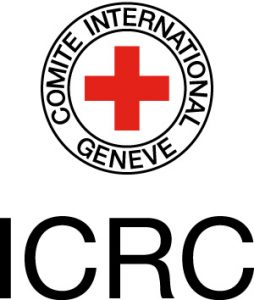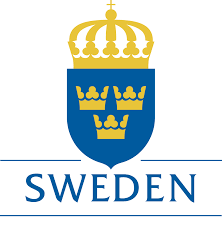LAUNCHING EVENT
Guidance for Armed Forces on the Protection of Health Care in Conflict
MARCH 2021
RECORDING AVAILABLE below !
The International Committee of the Red Cross ICRC in cooperation with the government of SWEDEN invites leading experts to participate in an interactive panel discussion:
LAUNCHING the Guidance for Armed Forces on the Protection of Health Care in Conflict
This event highlighted the concrete, practical ways that armed forces can better protect medical workers and equipment, and safeguard access to care, in armed conflict. Following introductory remarks and a presentation of the report, the event will include a high-level discussion of the contemporary challenges faced by uniformed and civilian military professionals and health care workers.
Introductory Remarks
Peter Maurer
President of the International Committee of the Red Cross
Ann Linde
Swedish Minister of Foreign Affairs
Presentation of Report Findings
Jan Ninck Blok
Legal Advisor IHL and Fundamental Principles, Netherlands Red Cross
Panel Discussion
Moderated by
Helen Durham
Director of International Law and Policy at the International Committee of the Red Cross
Panelists
Lieutenant General Dennis Gyllensporre
Force Commander of the United Nations Multidimensional Integrated Stabilization Mission in Mali (MINUSMA)
Marianna Tonutti
Governance Advisor – J9 Division, Supreme Headquarters Allied Powers Europe (SHAPE) NATO
Air Commodore Sharif Sarker
Director General (Training), Armed Forces Division, Bangladesh Armed Forces
BACKGROUND
Protecting health-care workers and facilities lies at the heart of international humanitarian law (IHL). Despite sustained collective efforts, medical personnel and assets continue to face violence and attacks that disrupt access to health-care services bringing curative and preventive healthcare programs to a halt, and reversing decades of public-health development work. United Nations Security Council Resolution 2286 (2016), adopted in the wake of repeated attacks against health-care personnel and facilities, calls on states to “develop effective measures to prevent and address acts of violence, attacks and threats against medical personnel.
The Health Care in Danger (HCiD), an initiative led by the International Committee of the Red Cross (ICRC), aims to address this issue by engaging widely with weapon bearers, policymakers, health-care workers and the general public. With the support of the Government of Sweden, and the Swedish Red Cross, the ICRC carried out an extensive study with input from more than 15 state armed forces and international organizations with a military component on their current doctrine and practice.
The research identified a series of practical measures that state armed forces can take to keep medical personnel and equipment safe from harm while carrying out military operations. This discussion will outline these steps and explore the challenges and opportunities to integrate the necessary measures into doctrine and practice.
ENGLISH

This document provides practical guidance on the measures armed forces can take to protect health-care workers and to limit the impact of armed conflict on access to, and delivery of, health-care services. It touches on matters relating to training, planning, operational readiness and the conduct of both domestic and extraterritorial military operations.
ARABIC
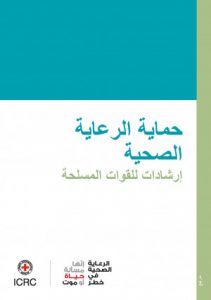
تطرح هذه الوثيقة إرشادات عملية بخصوص التدابير التي يمكن للقوات المسلحة اتخاذها لحماية
العاملين في مجال الرعاية الصحية، وللحد من تأثير النزاعات المسلحة على إمكانية الوصول إلى خدمات الرعاية الصحية وتقديمها. وتتطرق الوثيقة إلى الأمور المتعلقة بالتدريب والتخطيط والجاهزية العملياتية، وتنفيذ العمليات العسكرية داخل أراضي الدول وخارج حدودها.
FRENCH
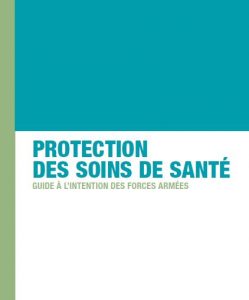
Le présent guide fournit des orientations pratiques sur les mesures que les forces armées peuvent adopter pour protéger les professionnels de la santé et limiter l’impact des conflits armés sur l’accès aux soins de santé, ainsi que sur leur fourniture. Il aborde des questions ayant trait à la formation, à la planification, à la préparation opérationnelle et à la conduite des opérations militaires menées sur le territoire national ainsi qu’à l’extérieur de celui-ci.
SPANISH
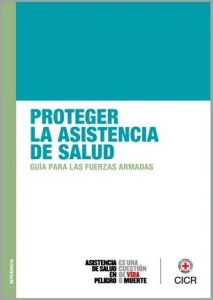
El presente documento ofrece una orientación práctica sobre las medidas que pueden implementar las fuerzas armadas para proteger al personal de salud y limitar las consecuencias de los conflictos armados para el acceso a los servicios de salud y su prestación. Aborda temas relativos a la formación, la planificación, la preparación operacional y la ejecución de operaciones militares nacionales y extraterritoriales
PORTUGUES
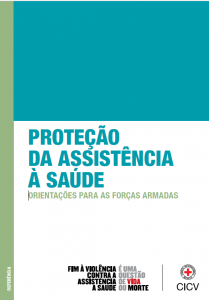
Neste documento são oferecidas orientações práticas sobre as medidas que as forças armadas podem tomar para proteger os profissionais de saúde e para limitar o impacto dos conflitos armados no acesso e na prestação de serviços de assistência à saúde. Nele são abordadas questões relacionadas ao treinamento, planejamento, disponibilidade operacional e a condução de operações militares nacionais e extraterritoriais.
